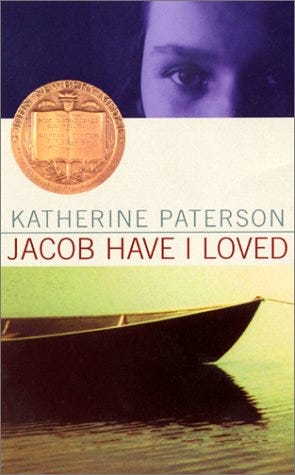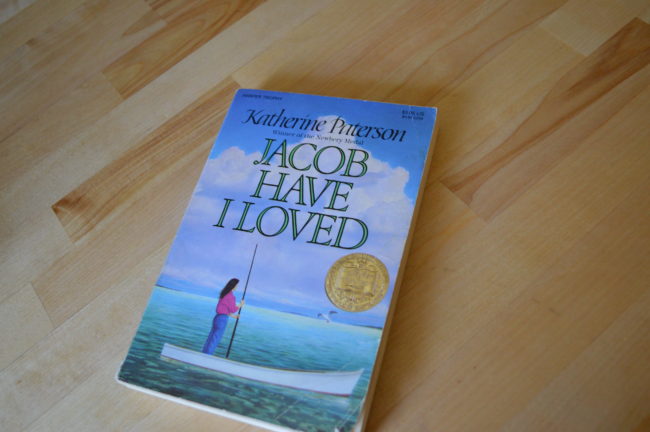
The 60th Newbery winner, Jacob Have I Loved, by Katherine Paterson, is the first of these Newbery books that I still have my copy of from when I read it as a child. Evidently, I liked it enough to print my whole address in the front, so it could be returned to me should I lose it. And twenty-odd years later the story of the twin sister who feels slighted by life was just as compelling. Sara Louise, or Wheeze as her beautiful twin sister Caroline dubbs her, navigates high school during WWII on a fishing and crabbing island in Maryland’s Chesapeake Bay. While Caroline is taking music lessons, Louise is fishing, first with her friend Call and then when the war takes him and other young men away, with her father. In her little community, Louise feels overshadowed by Caroline. Even her friend Call and the mysterious old Captain Wallace who returns to the island after 50 years cannot remain her private friends, and Louise feels deeply threatened and betrayed by their love of Caroline. Paterson creates a character in Louise that is somehow someone relatable and likable and at the same time deeply self-absorbed in her teenage angst, pushing away relationships that could be close and caring ones.

What I liked. I liked reading about life on the Chesapeake Bay. One of the best parts of living in Maryland was getting to spend time with my husband Evan’s family on the Chesapeake in Annapolis and the Eastern Shore, occasionally getting to sail or go on a crabbing boat with various members of the Hays clan. I could picture the little island life that Louise inhabited, and it made me miss Maryland a bit, even as Louise herself chaffed to leave it.



What was interesting. I think what was most interesting to me was how much of the book I did and did not remember. I remembered that the twins felt uneven, one beautiful and easy while the narrator felt unloved and ungainly. I remembered that the beautiful sister got her period a year before her twin, something that I felt were it to happen to me would have been unbearable and the ultimate injustice. But what I did not remember was that the the book was set during WWII, or that it was in Maryland along the Chesapeake , or her crush on the old Captain. Or in other words, I had forgotten what took up most of the book.

What were some limitations. I have to say that even though I was a little familiar with crabs, I still didn’t really get the description of which crabs were the ones Louise and her father wanted to catch at which time: something to do with the female life cycle, mating and shedding crab shells at various times. It didn’t really impair my ability to follow the story, but since it was Louise’s life and her focus, it might have made the story more vibrant if there were more of an explanation about the crabs.

Similarity to other Newbery winners. I think this book is unique in having a troubled sister relationship as the core conflict. Although having a crabby, angst-ridden-teen protagonist is similar to a number of other coming of age Newberies like Summer of the Swans, Johnny Tremain, Bronze Bow, and M. C. Higgins, the Great.

What it teaches me as a writer. One thing that is striking about this book is how Katherine Paterson tackles theological issues in the book brought up the by the title. The most difficult character in the book is the live-in grandma who is forever reading (or yelling) various verses from her Bible at her son and daughter and granddaughters. It’s the grandma who quotes the passage from Romans 9: Jacob have I loved, but Esau have I hated. (Although the worst is when Grandma starts yelling bits from Proverbs about prostitutes and fallen women leading men astray at Caroline and Louise’s sweet mother.) And anything that senile and embittered grandma says is a twisted truth out of context.
But Louise obviously does relate to Esau, not chosen by God to be the progenitor of His people Israel, the over-looked twin. And Paterson doesn’t directly do much to explain how it is that God is said to hate someone, except that you as the reader clearly see that Louise is deeply loved, and in the end Louise as a grown woman becomes a midwife and has this redeeming moment when she delivers premature twins and works hard to save the weaker one. Louise had always believed that as the stronger twin, the twin who needed no doctoring at birth, she was loved less than the fragile, beautiful, and talented Caroline who was doted upon and given the best of everything and everyone. But Louise comes to see, as the reader has been able to see for far longer, that that belief was mostly self-imposed and most of Louise’s suffering came not from being slighted or disliked but simply from believing she was.
I like that Paterson doesn’t shy away from tackling hard things, hard passages of Scripture, hard ways people trap themselves in their own heads. I think that Paterson and Madeline L’Engle have this amazing ability to write their faith into their books on a deep level, not shying away from hard things but offering up complex people who grow and change as partial answers to those questions.

Have you read Jacob Have I Loved? What are your favorite coming of age books?

Note This post contains Amazon affiliate links, which means if you were to buy a book, I’d get a tiny commission at no cost to you. Thanks for supporting Stories & Thyme!*
